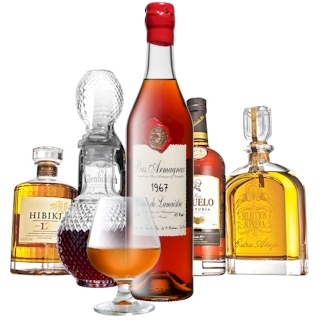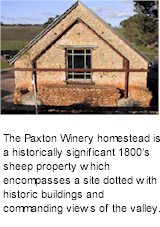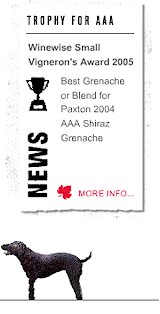


David Paxton has been growing grapes in McLaren Vale for almost 30 years. In this time he has developed and managed vineyards in the Adelaide Hills, Coonawarra, Yarra Valley, regions of Western Australia and has consulted to growers across the country. David's company Paxton Vineyards owns approximately 200 acres of premium McLaren Vale vineyards and manages over 500 acres in the region as well as over 25 on Kangaroo Island. Whilst the majority of the grapes grown by Paxton are sold to wine companies, a small portion is utilised for the Paxton label.

For decades Paxton have nurtured their vineyards in the McLaren Vale. During this time the philosophy and reputation has been built on growing grapes of exceptional quality. The Paxton mission now is to showcase quality, varietal expression and natural regional diversity within a range of wines that will indulge lovers of the finest drop. It's been heads down, tails up for everyone at Paxton, for as long as they can remember.
In Paxton's home of McLaren Vale South Australia, their vineyards are spread across a number of sites and soil types which are managed without compromise from planting to harvest. The Paxton winemaker's mission is to produce and showcase the region's fruit quality, varietal expression and natural diversity, particularly with Shiraz, which is now well recognised as the region's top performing variety.
It involves combining traditional, hands-on management, integrated and complimented with modern technology. The Paxton winemakers choose to propagate vines from old pre-clonal selection vineyards to benefit from stock with a history of low-yield and high quality. The vineyard site characteristics that the Paxton winemaking team target have soil profiles that allow perfect control of soil moisture content via irrigation, maximising fruit quality and intensity.

Here the winemakers work with the concept of terroir, although they make nothing of the mystery that is often attached to the word. It can be complex but it is not magic. Paxton considers terroir as the interaction between a vine, its environment and the impact of man's management with the moisture balance of the soil being possibly the major influence. Management techniques are varied to suit variety and style.
The Paxton name is known within the Australian wine industry for growing and supplying grapes to wineries, and only a small portion is utilised for the Paxton label. Utilisation of techniques such as shoot thinning, leaf plucking and fruit thinning are employed to attain superior quality. Targeted crop levels for Shiraz are 6 - 8 Tonnes per hectare.
Trialling of bio-dynamics and non-chemical weed control is ongoing. It is impossible to develop intimate knowledge of a vineyard in one or two years which is why the Paxton commitment to optimum quality is reflected by their long term staff and management.
In his youth, before becoming one of Australia’s leading viticulturists, David Paxton worked briefly as a wool presser and learnt of the AAA wool classing stencil that reflects superior quality. So too does the Paxton AAA, selected from the Gateway and Jones Block vineyards, renowned for producing some of the best fruit in the region. These select parcels were blended with complementary Grenache to create a wine that is engaging to a wide range of palates.
